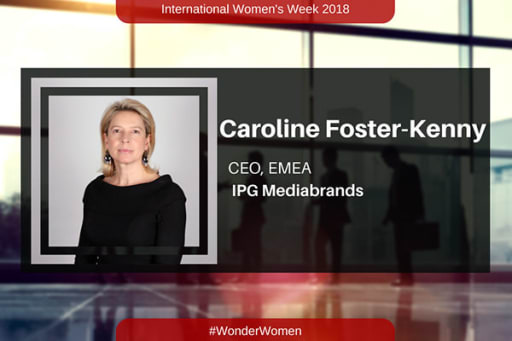Entrepreneurialism has been a recurrent theme in Caroline’s career. She launched the first media agency in Asia, CIA Hong Kong, in 1996 and extended the network across 10 markets within two years. This led to her being named China’s most entrepreneurial women leader by China’s highest circulation women magazine.
Caroline now drives transformation across IPG’s network, which has more than 8,500 employees across 130 countries. Her two core aims are to foster an entrepreneurial culture within an established business; and to champion the talent of tomorrow.
Why did you decide to build a media agency?
The media landscape was very different in the mid-nineties. Media agencies had recently been established and were quickly gaining a big market share at the expense of the ad agency, by delivering incremental value to their clients. Media specialists were becoming a successful and proven model in Europe and, against this background, the time felt right to expand the media agency model to Asia.
I was asked to spearhead the initiative and CIA Hong Kong launched in 1996. The plan was to learn from the challenges the sector had faced in the European market and effectively ‘leap frog’ them to jump-start a much needed new business model in this exciting region.
While we did face some hostility from the local full-service agencies and media owners, our approach proved successful. We won the consolidated media business for LVMH Group in the region, accounting for 19 brands, within six months. We expanded rapidly and had established a CIA Asia Pacific network operating across 10 markets within two years. You have to pick your moments, and in this case, the time, the place, and the model all came together.
What advice would you give to adapt leadership in a traditionally male-dominated sector?
Media has traditionally been rather male-dominated, particularly at a leadership level. Certainly within a network, a key challenge lies in how you approach different personalities, cultures, and situations. In my experience the key to success lies in actively listening to what is being said – and sometimes, not said. Surprisingly, this isn’t something that all leaders can or are even prepared to do.
By suspending your own agenda, you will truly be in the best position to hear and understand the issues, whether overt or bubbling under the surface. Next, learn to adapt the way you influence and lead, which means thinking on your feet. The media sector, like many verticals now, is in a permanent state of flux. To respond to this the best agencies are agile and this should also be reflected in their leadership.
What do you think is the most important investment to make in your talent?
To get the most out of your rising stars you need to nurture them by giving them the time and space to test and learn within a secure environment. There’s no point making that investment in talent if you aren’t going to listen and learn from them. The media sector prides itself on being ahead of the curve and while experience at senior levels remains all-important, fresh blood and diversity brings with it fresh perspectives and new ideas. So it’s hugely important that junior talent can be heard at the top of the organization.
Also, businesses shouldn’t be too blinkered about where that talent is drawn from. Yes, graduate programs remain hugely significant, but also look to the apprenticeship intake for the next generation of leaders. For whatever reason, whether it’s financial or down to learning style (for example), not everyone chooses higher education. Apprenticeships offer a different route into a highly competitive industry. Businesses should aspire to attract and retain the best talent – and it really doesn’t matter what the intake route is.
How have things changed for women in the workplace since you started out?
In many ways the business world has become much more attuned to supporting the needs of women employees since I started my career. Flexible and agile working to provide better work-life balance have been major steps in the right direction. However, when you look closer it becomes clear there’s still a long way to go and that’s immediately apparent at the most senior levels.
All too frequently I’m aware of being the lone or one of too few women in management and leadership meetings. I wouldn’t say this is necessarily intimidating, but it can be disheartening. At the very least it offers a stark reminder of how much further we yet have to go to achieve gender balance in senior roles.
And finally, what does International Women’s Day mean to you?
On one level International Women’s Day is a very positive date in the calendar in terms of celebrating women success and the importance of diversity in the workplace and beyond.
However, I then have to talk to my kids about why we actually need it. I would say that it’s easy to forget the battles women have fought to achieve equality – but many recent news stories and the ‘Me Too’ movement would suggest appearances can be deceiving in certain quarters.
We also need International Women’s Day as a reminder to step back and remember all those communities and cultures around the world where women are still far from equal to men. I actually hope for a time when we won’t need a ‘Women’s Day’.


